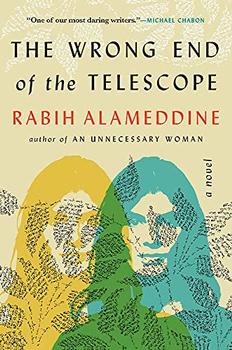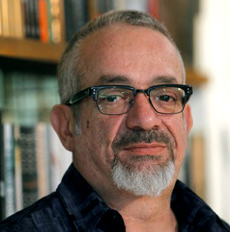Summary | Excerpt | Reviews | Beyond the Book | Read-Alikes | Genres & Themes | Author Bio

This article relates to The Wrong End of the Telescope
 In The Wrong End of the Telescope, Rabih Alameddine creates a character that appears to be a stand-in for himself, described from the perspective of the novel's narrator, Mina. Mina paints the character as a friend of hers who has written essays about his experiences with refugees as well as fiction. The author's real-life work parallels this description, and several comparisons can be drawn between his writing career and that of the writer in the story.
In The Wrong End of the Telescope, Rabih Alameddine creates a character that appears to be a stand-in for himself, described from the perspective of the novel's narrator, Mina. Mina paints the character as a friend of hers who has written essays about his experiences with refugees as well as fiction. The author's real-life work parallels this description, and several comparisons can be drawn between his writing career and that of the writer in the story.
After having spotted the Alameddine-like character in the novel, Mina's friend Emma tells her, "You sent me one of his books for Christmas, unreadable, worst gift ever. Why would I care about an old woman who doesn't leave her apartment? Didn't make any sense to me. That's not a story, that's just stupid."
While this would be an especially uncharitable reading of Alameddine's book An Unnecessary Woman, Emma's description more or less corresponds to its plot. This previous novel of the author's is the story of Aaliya Sohbi, a 72-year-old woman living in Beirut who is, yes, something of a recluse, but has a rich inner life as an amateur literary translator and is a highly entertaining narrator. Alammedine is the author of several other works of fiction, including The Hakawati and The Angel of History, but the allusion to this particular work of his shows Emma questioning the "necessity" of the author's presence on Lesbos among newly arrived refugees, which has a humorously deprecating effect but also highlights the character's (and perhaps the author's) struggle with understanding his place in the crisis surrounding him. It additionally sets up Mina as a counterpoint to Aaliya. Unlike the protagonist of Alameddine's earlier book, who despite her talents and intellect is considered useless by her family, Mina, a doctor providing medical care for refugees, is practically the definition of "necessary." And yet like her writer friend, she still struggles with feelings of helplessness and doubt.
Alameddine has also written non-fiction, as is referenced in connection with the writer character resembling him in the book. Mina frequently cites the writer's meetings with refugees and his subsequent essays. A couple of years after the start of the Syrian Civil War, Alameddine the real-life writer began going to refugee camps in Lebanon to speak with Syrians who had fled violence in their country. He tells the New York Times how he realized that despite the fact that his presence fundamentally changed nothing about the immense loss and destruction they had experienced, he could still provide "an ear."
An essay by Alameddine on his time spent with Syrian refugees, "Hope and Home," was published in Freeman's and later anthologized in The Best American Travel Writing 2018. The Wrong End of the Telescope is Alammedine's fictional take on some of the same subject matter, and deals with Syrian refugees arriving in Lesbos during a timeframe that is implied to fall across the end of 2015 and early 2016.
Of his attempts to talk with refugees, Alammedine says, "There is absolutely not one thing I can do, but not doing something is a crime." This attitude is reflected in The Wrong End of the Telescope, which strives to create a full story out of an indirect and incomplete narrative surrounding the refugee crisis, all while acknowledging the limitations of its viewpoint.
Rabih Alameddine, courtesy of the author's website
Filed under Books and Authors
![]() This "beyond the book article" relates to The Wrong End of the Telescope. It originally ran in October 2021 and has been updated for the
August 2022 paperback edition.
Go to magazine.
This "beyond the book article" relates to The Wrong End of the Telescope. It originally ran in October 2021 and has been updated for the
August 2022 paperback edition.
Go to magazine.
Knowledge is of two kinds. We know a subject ourselves, or we know where we can find information on it.
Click Here to find out who said this, as well as discovering other famous literary quotes!
Your guide toexceptional books
BookBrowse seeks out and recommends the best in contemporary fiction and nonfiction—books that not only engage and entertain but also deepen our understanding of ourselves and the world around us.